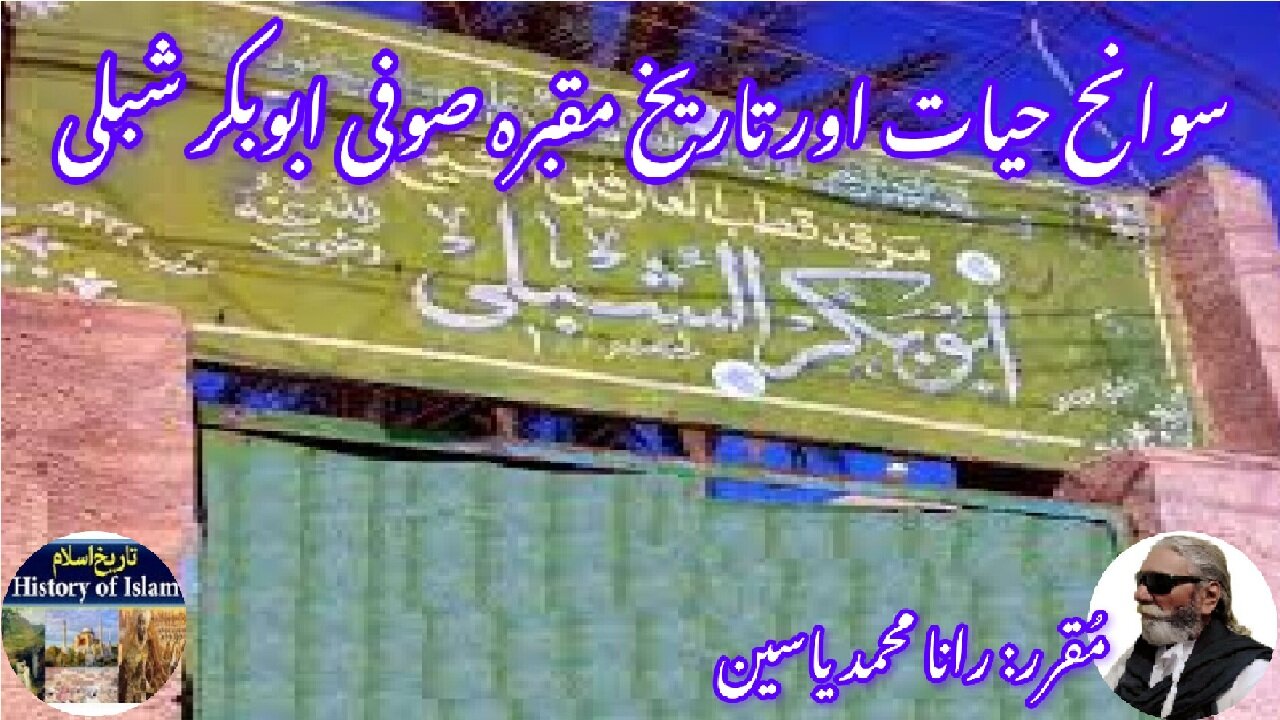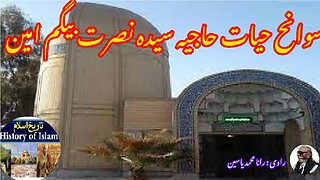Premium Only Content

Biography and tomb Scholar Abu Bakr Shibli| विद्वान अबू बक्र शिबली |سیرت و مقبرہ اسکالر ابوبکر شبلی
@islamichistory813 #SufiSaint #CulturalHeritage #IslamicMysticism #IslamicPhilosophy #SuhrawardiShrine #HistoricalFigures #AbuBakrShibli
Biography of Islamic Scholar Abu Bakr Shibli
Dekhti Aankhooon aur sountay kaanoon ko Asslamoalaikum, sisters, brothers friends and elders,
Abu Bakr Shibli, also known as Abu Bakr al-Shibli, was a prominent Islamic scholar born in the city of Baghdad in the year 862 CE (248 AH). Baghdad, at this time, was a thriving center of culture, trade, and scholarship in the Islamic world, known for its vast intellectual atmosphere, which greatly influenced Shibli's early development. He hailed from a humble background, which provided him with the opportunity to engage deeply with various disciplines of Islamic knowledge. Shibli's formative years were marked by a thirst for knowledge, curiosity, and a profound spiritual inclination, all of which laid the foundation for his later contributions to Islamic thought.
Shibli's education began in his hometown, where he was exposed to the teachings of various scholars. He studied Islamic jurisprudence, theology, and Sufism, immersing himself in the rich intellectual traditions of his time. His dedication to learning saw him travel to various cities, including Nishapur and Kufa, where he studied under prominent scholars. Among his notable teachers was the famous Sufi master, Abu al-Husayn al-Nuri, who significantly influenced his spiritual journey. Shibli's deepening understanding of Sufi principles and practices shaped his worldview, guiding him toward a life dedicated to spirituality and enlightenment.
Abu Bakr Shibli is best known for his significant contributions to Sufism. He became a renowned Sufi saint and was associated with the Qadiri order, known for its emphasis on love, devotion, and the pursuit of God. Shibli's life was characterized by his deep devotion to God and a relentless pursuit of knowledge. He emphasized the importance of inner purity and moral integrity, which resonated with many of his followers. His teachings often revolved around themes of divine love, humility, and self-discipline.
Shibli's legacy as a Sufi master and scholar is vast. He is remembered not only for his spiritual teachings but also for his literary contributions. His writings and poetry reflect a profound understanding of the human experience, articulating the struggles of the soul in its quest for God. His eloquence and depth of insight have inspired generations of scholars and practitioners of Sufism.
Shibli also played a crucial role in bridging the gap between Islamic jurisprudence and Sufism, advocating for a harmonious relationship between the two. He believed that true understanding of Islamic teachings could only be achieved through a combination of knowledge and spiritual experience. His influence extended beyond his lifetime, and many of his disciples and followers continued to spread his teachings, further solidifying his impact on Islamic spirituality.
Abu Bakr Shibli passed away in the year 946 CE (334 AH) in Baghdad, where he had spent most of his life. His death marked the end of a significant chapter in the history of Sufism, but his teachings and writings continued to thrive long after his passing. Shibli's shrine is located in Baghdad, serving as a place of pilgrimage for many Sufi followers and admirers of his work. His resting place has become a significant site of reverence, attracting visitors who seek to connect with his spiritual legacy.
The shrine of Abu Bakr Shibli was constructed by his disciples and followers shortly after his death. It stands as a testament to his influence and the deep respect he garnered throughout his life. The structure has undergone various renovations over the centuries, reflecting the changing architectural styles and cultural influences of Baghdad. Despite these changes, the essence of Shibli’s teachings remains preserved within the shrine, making it a sanctuary for those who seek solace, inspiration, and spiritual guidance.
The life and teachings of Abu Bakr Shibli represent a rich tapestry of Islamic scholarship and spirituality. His contributions to Sufism, coupled with his literary works, continue to resonate with seekers of truth and knowledge. The enduring legacy of Shibli serves as a reminder of the importance of spiritual inquiry and the profound impact of love and devotion in the quest for understanding. His shrine in Baghdad stands not only as a memorial to his life but also as a beacon of light for those who follow the path of Sufism, embodying the timeless principles of compassion, humility, and divine love that he so passionately advocated.
Sisters brothers friends, and elders, now give us permission, up to tomorow, and tomorow we will described . Allah Hafiz
===================
-
 6:51
6:51
ISLAMIC HISTORY
1 day agoBanu Amin and the history of his shrine بنو امین کی سوانح عمری اور ان کے مزار کی تاریخ
4 -
 20:47
20:47
Scammer Payback
6 hours agoWe Turned a Scam Call Center into a Pizzeria
6.18K3 -
 31:04
31:04
Clownfish TV
4 hours agoI Watched FANTASTIC FOUR: FIRST STEPS So You Don't Have To...
6.6K8 -
 1:58:01
1:58:01
The Charlie Kirk Show
3 hours agoLower Legal Immigration + Obama's Immunity? + AMA | Hemingway | 7.25.25
47.4K17 -
 28:44
28:44
The Official Corbett Report Rumble Channel
17 hours agoFrom Age Verification to Digital ID - New World Next Week
15.3K9 -
 7:15
7:15
Adam Does Movies
19 hours ago $0.59 earnedEddington - Movie Review
20.2K1 -
 1:09:43
1:09:43
The Big Mig™
2 hours agoGlobal Finance Forum w/ Guest, Financial Expert Joe Lombardi
12.8K8 -
 17:37
17:37
Professor Gerdes Explains 🇺🇦
3 hours agoUkraine's Drone Blitz: 10 Russian Regions Under Attack
10.9K1 -
 1:23:46
1:23:46
Steven Crowder
5 hours agoWOKE DEBATE: How Bad Does Fantastic 4 Suck & Can Hot Chicks Save America
236K178 -
 1:22:37
1:22:37
The Shannon Joy Show
4 hours ago🔥🔥LIVE Exclusive With Nick Bryant - The OG Journalist Who Broke The Epstein Scandal And Released His Black Book!🔥🔥
16.6K3